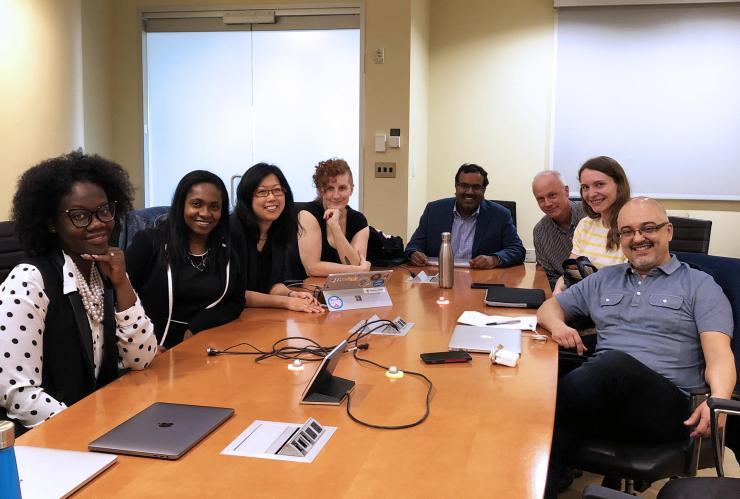South Big Data Regional Innovation Hub Hosts Annual All-hands Meeting
Apr 18, 2019 — Atlanta, GA

The South Big Data Regional Innovation Hub leadership team met with leaders from the other three NSF-funded regional hubs during the 2019 all-hands meeting.
The South Big Data Regional Innovation Hub (SBDH) hosted its annual all-hands meeting last week on April 9-10 in the Technology Square Research Building on the Georgia Institute of Technology campus. Themed “Breaking Silos, Bridging Solutions, and Accelerating Partnerships,” the successful meeting was organized to build the community by bringing together the broad SBDH membership to share information on data and data science projects, tools, and discoveries.
Georgia Tech’s Executive Vice President for Research Chaouki T. Abdallah launched the meeting with welcoming remarks, including stressing the importance of the SBDH for “taking scientific approaches to solving social issues, including those in healthcare and smart cities.” He lauded the hub’s work in “outstanding research on smart grids, a smartphone app for healthcare, and the DataUp program.”
The accomplishments Abdallah referenced hail from research coming from SBDH spoke projects, which are each funded with a $1 million award to focus on regional challenges. The Smart Grids Big Data group project includes 52 academic partners, 32 industry service providers and utilities, and 22 government and non-profit partners. The group discovered the potential for major improvements in smart grid operation.
Another spoke project, Large Scale Medical Informatics for Patient Care Coordination and Engagement, includes a six-university team that developed a smartphone app and cloud infrastructure to analyze patient behavior, environment, and health to provide insights into health effects of daily behaviors, with the goal of understanding and mitigating health disparities in African American and Hispanic populations.
And finally, SBDH Executive Director Renata Rawlings-Goss led the DataUp program to increase the capacity of Southern schools to teach data science, particularly at minority-serving institutions, community colleges, and four-year liberal arts colleges. The effort resulted in a 50-page report that provided integral data and information for the National Academies of Sciences, Engineering, and Medicine's project Envisioning the Data Science Discipline: The Undergraduate Perspective.
Attended by more than 100 individuals, the meeting included participation by researchers from key universities in the Southern region, representatives from local companies in the healthcare and consulting industries, as well as members of government entities.
“The SBDH serves 16 Southern states from Delaware to Texas, and Washington D.C. with more than 1,000 members from 290 organizations, including academia, industry, government, and non-profits,” said Srinivas Aluru, the principal investigator (PI) for the SBDH, co-executive director of the Institute for Data Engineering and Science, and a professor in the School of Computational Science and Engineering. “The all-hands meeting is one of the most important events we hold as it is integral to fostering R&D collaborations in the thematic areas of interest to the SBDH region.”
An important component of the first day of the meeting was a panel discussion by the PIs for the six spoke visionary projects. The spoke leaders include three Georgia Tech faculty members: Ashok K. Goel from the School of Interactive Computing, Gari Clifford from the Department of Biomedical Engineering and interim chair of Biomedical Informatics at Emory University, and Santiago Grijalva, the Georgia Power Distinguished Professor of Electrical and Computer Engineering.
Day one also featured a panel on priority areas composed of the hub’s co-PIs and priority area representatives that focused on an effort to launch new initiatives in the areas of greatest need. Breakout sessions, a student poster session, and a keynote speaker at dinner rounded out the first day of the all-hands meeting.
Day two of the all-hands meeting included working groups on cyberinfrastructure and social cybersecurity, as well as an industry panel with representatives from Anthem, Microsoft Research, Stanley Black & Decker, and others.
The successful event concluded with meetings for steering committee members, who serve as an advisory group for the hub and help disburse seed funding, as well as meetings amongst member representatives from the other three regional hubs funded by the National Science Foundation.
Josie Giles
IDEaS Marketing Communications Manager
josie@gatech.edu




